It's almost impossible to believe
that in a music career which has lasted about 50
years, with multiple hit singles, several TV series and a good amount of
movie work, that Lulu has never played a full concert in New York City.
That will all
change
this week when Lulu fronts an all-star band of TV musicians –
including Paul Shaffer, Jimmy Vivino, Will Lee and Rich Pagano – to play a highly anticipated gig
on Saturday, February 16 at BB King's
on 42nd Street, right in the midst of the Times Square area.
That's a long way from
her beginnings, as a young Glasgow-born soul singer
whose given name is Marie McDonald McLaughlin Lawrie who had her first
hit at fifteen-years old with a cover of The Isley Brothers' "Shout" as
the leader of Lulu and the Luvvers.
Lulu continued having
hit after hit in her native England and became a star in the States when
she acted in and sang the title track to the Sidney Poitier film To
Sir With Love.
Lulu has been recording and acting ever since, having big
hits like "Oh Me Oh My (I'm A Fool For You Baby)" and "I Could Never Miss You (More Than I Do),"
writing Tina Turner's smash hit "I Don't Want To Fight" and recording
duets with superstars such as Paul McCartney, Elton John, Sting and Take
That, with whom she topped the European charts with "Relight My Fire."
The day after Lulu arrived in the US to prepare for her long-overdue New
York debut,
she gave us a call to talk about the show and her storied career.
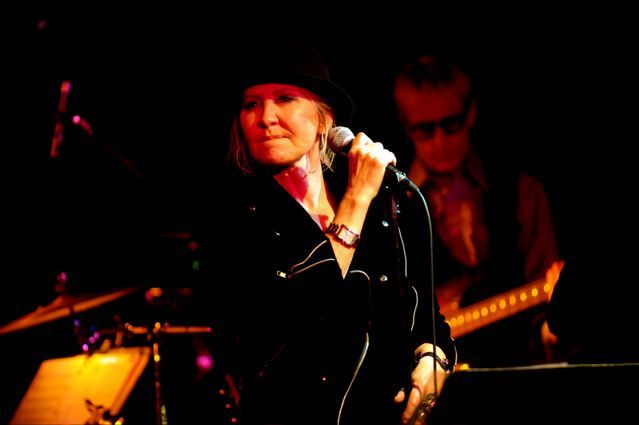 How is it possible
that this is your first New York show?
How is it possible
that this is your first New York show?
I ask myself the same question. How is it
possible? When really, my history from a child
[is that] my roots are so steeped
in American music. Not British music. In fact, my guitarist
Alan Darby is also Scottish, from just outside Glasgow. He played with
Clapton. He's that kind of guitarist. A really great blues, rock and
roll guitarist. Like me
– maybe it's the Scots – he didn't care
for British music until The Beatles. Of course, The Beatles were
influenced by the same music that we liked. If you like BB King or I used to listen to Sister Rosetta Tharpe,
as well as appreciating what Bobby Darin could do with a song. He
could turn it from a pop song into something bluesy and gospel.
Then you have even little Brenda Lee.
It's like going to church.
How cool is it
that you used to listen to BB King and now you are playing at his club?
Well, of course, his name is on my mind. But, his
version of "The Thrill Is Gone" has always been one of my top ten
favorites. Ray Charles was number one on my list.
You've got an
all-star band set up for the date. What can we expect from your BB
King's show? Have you played with the guys yet?
I have never played with them. That's slightly
nerve-wracking, even though they have the most unbelievable reputation.
I've met Paul Shaffer. There is no doubt that it's going to be a good
show, because they know what they are doing. They know their onions.
For a musician, you can get up and you can do a
song with somebody that you never met before. To do an hour show and
half of the material you've not done before is a new adventure.
I do only have one rehearsal with them, so, I'm really
going for it. I've been rehearsing with some of my own musicians.
The songs I don't know, is this the key I should do it? I'm even trying
some songs and saying, nah, I don't think I'm going to do that. Or what
about this one? So, it's as if I'm going back to
the start. (sings) "Going back to my roots." (Speaks again)
It's exciting, but I am a bit nervous, because as you say, it is
my debut. (laughs)
Are you going to be
doing stuff from throughout your career? Will you be doing any covers?
I will certainly be doing a couple of obvious songs
from my own career. There's so many of them that I wouldn't do,
because they're too poppy. There was a time in my career when I was so
young and guided by producers and record companies that I
would say now probably didn't quite know what to do with me. Because I
looked little and cute, they wanted me to be Herman's Hermits and I was
clearly not Herman's Hermits. A different kind of voice.
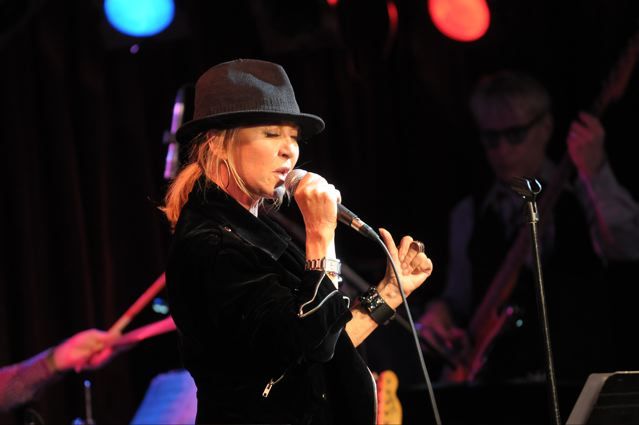 Your music back in
these days is mostly thought about as pop, but you have always had a
very strong R&B sensibility musically.
Your music back in
these days is mostly thought about as pop, but you have always had a
very strong R&B sensibility musically.
Yeah. A lot of those songs won't be included.
I
had so many hits back there, but I wouldn't do those. There are some
favorite songs that I've had forever. In fact, one song in particular
that I did when I was 13 years old. I used to do it, when I sang on
weekends with a band. I've put that in. It sounds really fine. It's
just great to do that, you know?
Which song is that?
Do I tell you?
It's up to you. If
you'd like to keep it a surprise, you can.
I'm torn, do I tell you my act? Do I tell you the
list of songs?
Oh, no, you don't
have to tell me everything you're playing. I just asked about this one
because you were specifically mentioning it.
I'm going to do "Shout" for sure. I will
do "To Sir With Love," but I'll do "To Sir With Love" with a slightly
different feel so that it fits the set. Not the way I did it on
American Idol, which was a Barry Manilow arrangement and was amazing
for that show. And not the way I did it when I sang it in the film. I
will do "Oh Me, Oh My," which I had a hit with
here. I'll do "I Don't Want To Fight," which is the song that I
wrote for Tina Turner. That's just a few.
You literally were a
little girl when you started singing professionally. Could you have ever
imagined that 50 years later you would still be able to make a living in
music?
It's crazy, isn't it? But today, it's not so much.
Actually, it's kind of going back to my roots again. I don't do it
so much for the money. When I started, I didn't do it so much for the
money. To get paid was like: Whoa! I get paid for this? It wasn't a
lot, of course. Then you become a business.
It's all about
getting those fees, about taking jobs. Some of the jobs you don't
even want to do. You take them because of the money, because you have to
pay bills and stuff like that. Your living becomes completely the
opposite of what you were used to as a child. Today, I don't so much do
the gigs because I'm going to get paid a lot of money. I'm doing
it now
why I did to start with, because I love it. And I've always loved it.
Then, sometimes along the way, I thought, why am I doing this? I don't
want to do this kind of stuff. It's like I planted a
seed years ago about doing this and it's just come to fruition. I feel
like it happened overnight, but really, you have to be careful for what
you wish for, because it's happening. It makes me a little nervous,
(falsetto) Ohhhh.... (laughs)
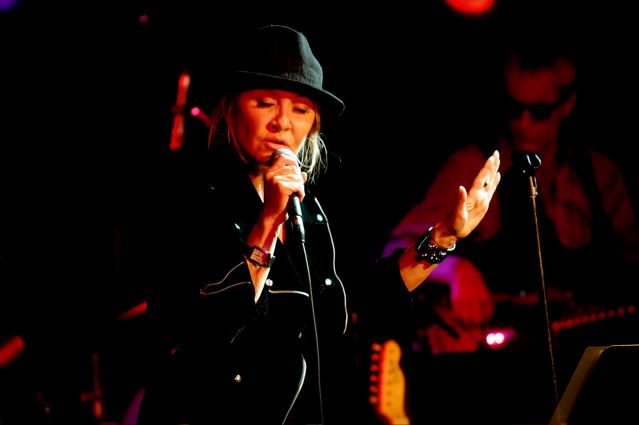 You were only 15
when your cover of "Shout" hit the charts. What was it like to suddenly
hear your music on the radio – could you even hear it with the old BBC
or was it just on Pirate Radio?
You were only 15
when your cover of "Shout" hit the charts. What was it like to suddenly
hear your music on the radio – could you even hear it with the old BBC
or was it just on Pirate Radio?
It certainly was a
saturation the way it became, but [pirate radio] was how young people heard new
music. Unless, like myself, you lived in Glasgow and you did work with
a network of musicians. There were American soldiers and sailors
coming through the port of Glasgow. They would bring American music,
all the 45s. So I had an outlet to get the music that wasn't available
in the UK. Answering your question, it was kind of not a real
experience... it was unreal. I relate to a lot of young kids who
become instantly successful today and find it difficult to cope. But it
was a different business then. I lived to sing. I didn't want to be
famous. It was that kind of drive.
You came up at the
height of the British Invasion and in the middle of the whole swinging
London scene.
I moved to London.
My manager, an amazing woman
called Marion Massey, lived in London. She
and the agents decided that I couldn't do it from Glasgow.
Way later down the line, people like U2 decided they could
live in Ireland and still do their music all over the world.
At
that time you had to be in the hub of it. At that point it was London.
What was
the
scene like?
My memory is so bad.
I don't really remember too many details. People keep saying to me,
"Jesus, you were there!" and I go, "Oh, yeah, that's right, I was." I
was so busy. I had my head down. First, I was on the road, seven days a
week, 52 weeks a year. When you're 15, you can do that. My parents
allowed me to go, because I had this female manager who had kids of her
own and was married. She took care of me when I was in London. I lived
with her family. I was on the phone to my mother every night, telling
her what had happened everyday. You know, hanging out with The Beatles
and Stones and The Animals. Then, of course, The Bee Gees, and I
finally married a Bee Gee.
Yes, Maurice...
It was all a little
bit of a whirlwind and it's amazing that I'm still alive to tell the
tale.
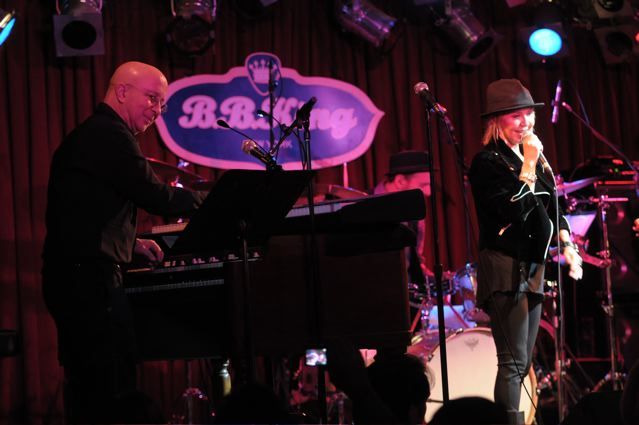 Certainly
your best-known song in the States is the theme from
To Sir With Love. When you were
recording the song, did you have any clue that it would become the type
of musical standard which it has?
Certainly
your best-known song in the States is the theme from
To Sir With Love. When you were
recording the song, did you have any clue that it would become the type
of musical standard which it has?
First of all, I had
the song written. Making the movie, my manager said, "If you want her
in the movie, she has to sing the title song." That was in my
contract. That was the deal that was made for me, which was kind of
genius, now that you look back. They came up with these really awful
songs. I thought because Columbia Pictures were connected to Screen
Gems publishing, they would have Burt Bacharach or some of the greatest
writers in the world. But they didn't. The songs that were sent were
to me, I didn't feel that they were right or good enough. So, I
initiated in the room the writing of that melody with Mark London, who
said, "Nah, they'll never use it." I said, "sit down, sit down!"
We
both sat down and he played the piano, rather badly, and came up... I
wish I had said put my name to it, because really and truly I had a part
of it, but one has to be grateful for what one has. Then, I said,
"That's it! That's it. That run will do." Because I was desperate.
They were sending rubbish. The people involved with the film didn't
care. It wasn't important to them. They could have a little song, it
didn't matter. They didn't know. But to me, it was really important.
Then we called Don Black, who was famous for writing "Born
Free." I can't remember what else he had written at that time, but he
was pretty out there as a lyricist. He looked at the script, came back
with the lyric and the lyric helped the melody.
The melody is actually a very odd melody. It's not a song that you're
going to have people singing at parties. You're not going to sing it
without accompaniment. It's not easy to do. It's kind of an odd, out
of the box song. But his lyric was so descriptive and painted a picture
of what actually was happening in the film. He's brilliant.
Then we did the
song and I had a real problem. Mickey Most [her producer] didn't like
it. He didn't care about it. I was crying. "Mickey, you've got to do
this because it's going to be in the film. I'm in the film!" And he
was like, "Whatever." He half-heartedly recorded it. He didn't put any
heart and soul into it, the way he did with a lot of other stuff that we
recorded. He did it because he really had to, because I was so emotional
about it. Then he brought, I think, four string players in. I said,
"Four violins? We should have like 16." Even at that age, I knew he
was skimping on it, you know? He then
refused to put in on the A-side of the single. Can you imagine? I was
pulling my hair out, and I was just 16 at the time. He put it on the
B-side, but what happened was, in England, they didn't care about the
film. It was no big deal. They didn't care about watching, because the
issues in that film were not so prevalent in England as they were in
America. The political issues. They didn't make a big deal of the film
there and the song didn't get played very much. But in America, it was
massive. What happened was, the disk jockeys in America turned it
over. The record companies, they would issue this is the A-side. This
is the one we want you to play. The jockeys, because the film had come
out and they had obviously seen and heard it, they literally turned it
over and made the B-side the A-side. That's what made it number one! (laughs)
Can you imagine? I was beside myself.
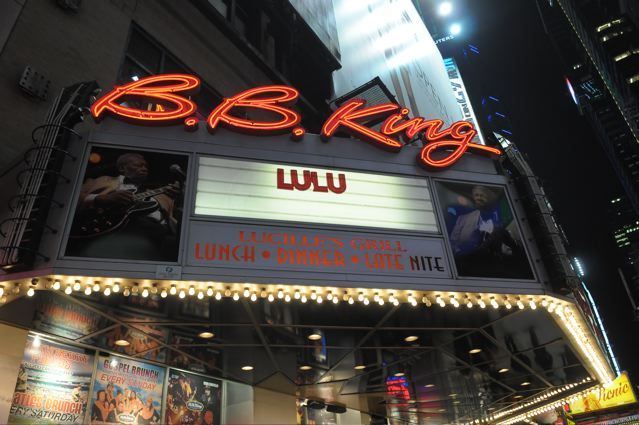 To Sir With
Love also started your acting career, which you
have done on and off over the years since. How did that opportunity
come about and what was it like starting out working with Sidney
Poitier?
To Sir With
Love also started your acting career, which you
have done on and off over the years since. How did that opportunity
come about and what was it like starting out working with Sidney
Poitier?
Nerve-wracking. Very
nerve-wracking, because I thought, "What the hell? You don't know what
you're doing." But I certainly had what Jewish people call chutzpah, even though I was shaking on the inside. What happened was James Clavell [the filmmaker who
later wrote the novel Shogun] was looking for kids to be in the
film. He was looking for young actors. My manager's sister worked for
a big agent called John Heyman, who actually is [the father of]...
what's his name, the boy who produces Harry Potter? Uh, it's not
Michael. [ed. note: It's David Heyman.] Anyway my
manager's sister worked for a big agency and they were looking
for kids to be in this film. My manager thought I should act,
even though I had never had any training.
James Clavell came to
see me in concert. I was on tour with The Beach Boys. I was their
support act and I had a top ten hit at this time. I think they were
number one with "Good Vibrations." He came back to
my dressing room and said to me, "You know, if you're going to be in my
film, you'd have to change the color of your hair." I said, "Look, if you want me in your
film, I'm not changing the color of my hair." Generally, he was very,
very antagonistic. But he did that on purpose to hear
the reaction. So
obviously I said the right [thing]...,
[well] I probably put my foot in my mouth, but I
got the part. (laughs) He said, "She's in. She's in." Really, it wasn't a big
part, but I got such a reaction that when I was in England and the film
took off, I got a telegram. Columbia Pictures said, "America loves
Lulu. We want her over here." The record
went to number one.
Before it went to number one I had to do The Ed Sullivan Show and
fly right back. I did a lot of TV and stuff like that. By the time the
film came out, I had my own television series in England, Saturday
nights.
Was it fun working
as a TV hostess? You actually had several variety shows on the BBC over
the years.
There were many, yeah.
That was because my manager wanted me
to have longevity. She wanted me to be the all-around entertainer: Sammy
Davis, that kind of thing. Or Lucille Ball. She thought that I could move into that area
and not just be considered a pop singer. A lot of my rough edges were
smoothed off in order to train me. I was trained on the blooming
screen. Like acting, I never had any training.
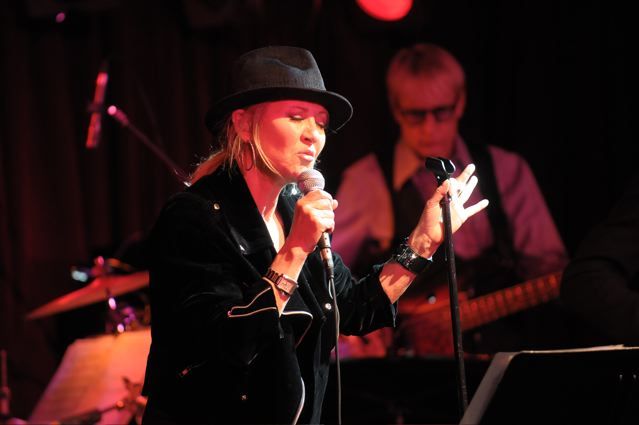 Acting wise,
you also did a well-known stint on Absolutely
Fabulous.
Acting wise,
you also did a well-known stint on Absolutely
Fabulous.
That was way, way,
way down the line.
Yes, I know. Do you enjoy
doing comedy?
Yeah, it's great.
And working with those guys is so smart and fabulous.
You worked with
lots of amazing musicians over the years, people like John Paul Jones,
who went on to be in Led Zeppelin.
John Paul Jones was
my musical director. He did all the arrangements for
Mickey Most, all the records I made with Mickey from the age 16.
When I would do gigs, he would conduct the band with his bass. Before
that, when I was 14 or 15, Jimmy Page would be on my records.
You also did that
two-sided single with David Bowie as he was just exploding.
I worked with Bowie,
that's right. It was great, because he thinks out of the box. He's
extremely adventurous. He loved my voice. He said,
"I'm going to make a
hit record with you." And he did that, you know? Then we did some other
stuff that was never released, because he split up with... what was his
manager's name?
Tony DeFries...
There were tapes
then. They went to his manager and [DeFries] wouldn't release the songs.
Now I have to
admit I was really young when your first wave of singles came out, so
for a while I knew you best for your 1980s single "I Could Never Miss
You (More Than I Do)."
Ah, that's a really
good song. That came out on Rocket [Records], you know? That was on
Elton [John]'s label.
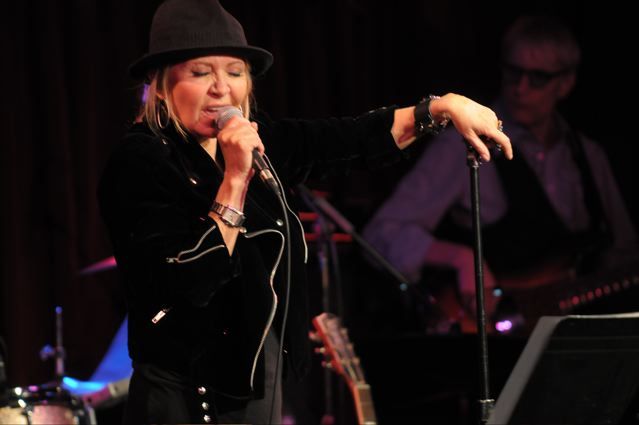 While I know you
had been around and having hits in Europe through the years that was the
first time you'd gotten US airplay in a bit. Was that an exciting
feeling to still be getting radio hits after all that time in the US?
While I know you
had been around and having hits in Europe through the years that was the
first time you'd gotten US airplay in a bit. Was that an exciting
feeling to still be getting radio hits after all that time in the US?
Yeah. It's funny,
each time I came to America, there was always something that held me
back from literally moving here. So many people said to me
"that was a
big mistake in your career." You could look at it like that, if
you think of how influenced I was by American music. Anything that was
sort of in my opinion rinky-dink or twee that I did, I hated it, because
I had a raw quality. But who knows?
If I had been with a
younger management company and stayed on the rock and blues circuit,
maybe I wouldn't be here today.
I was in
London about ten years ago when your duets album
Together was just being released
and I remember I was hearing such good things about it that I picked up
a copy at an HMV at Heathrow. How gratifying was it that superstars
like Paul McCartney, Elton John and Sting wanted to work with you on
that project?
It was great. It was
really great. That's a real compliment. I enjoyed that so much. I
enjoyed working with them all.
Tina Turner
covered your song "I Don't Want To Fight" and had a huge hit with it.
That came when I did
a record with a little boy band called Take That. We had a number one
record ["Relight My Fire"] at the same time Tina recorded that for her
film. I think she hadn't had a hit in America for seven years. So it
was all amazing. People kept saying, "Why didn't you do it?" It's so
obvious to me why I didn't do it. First of all, I wouldn't have gotten
the coverage, because the film company was spending bazillions on
promoting the film [What's Love Got To Do With It?]. The record
company was also spending on promotion for the album. So it was a smart
move for her to do it.
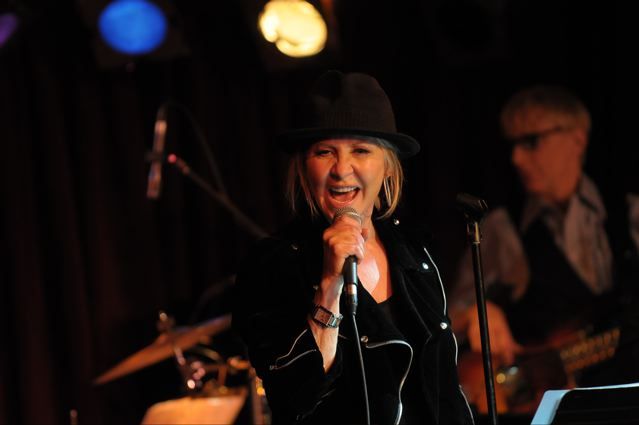 While you have had
several hits in the US, your career has always been bigger in England
and Europe. Like, for example I know you're still releasing albums
pretty regularly in England, but they don't seem to cross the pond so
much. Have you been
surprised by the directions your career has taken?
While you have had
several hits in the US, your career has always been bigger in England
and Europe. Like, for example I know you're still releasing albums
pretty regularly in England, but they don't seem to cross the pond so
much. Have you been
surprised by the directions your career has taken?
Yeah, I have really.
Right now, next week I'm getting back to where I started.
What would people
be surprised to know about you?
(laughs)
It's funny to answer a question like that about yourself. You really
have to think about it. I take myself for granted so much.
Looking back on
your career, how would you like for people to see your body of work?
My whole body of work
is not something that I would love. There are so many
years that I think I spent in the wilderness. Having hits, but for me,
I spent time [feeling unfulfilled as an artist]... I think what people would not
immediately get from me is that I am completely driven. Completely
focused. It's all about the work. I'm small,
I'm blonde, people have always called me cute and I've got a
personality, but that belies a steely core.
People just say,
"Oh, she's so cute." (laughs) They don't know me. (laughs
harder)
Is that the
misconception you would most like to clear up?
I think that is a
misconception, yeah. I was trained at a time in the 60s when it was
the way to be. To be... not dishonest, it's not about being
dishonest, but I was something that I imagined I should be.
When I grew up, ambition was a dirty word.
For a woman to be really strong, you couldn't show it.
(laughs hard) That's crazy. If I sit
down and have a meeting and people are chatting, I'll
pull it back
on track and say, "Wait a minute, this is business. I'm not messing
around here." They sometimes look at me and they go, "Oh, my God."
Sometimes I think in business, it's not really accepted for women to be
confident and strong. So I've always allowed other people to be my
mouthpiece, because of what I feel was accepted.
That was maybe
what was necessary. Not anymore. I'm too old for that. (laughs
again)